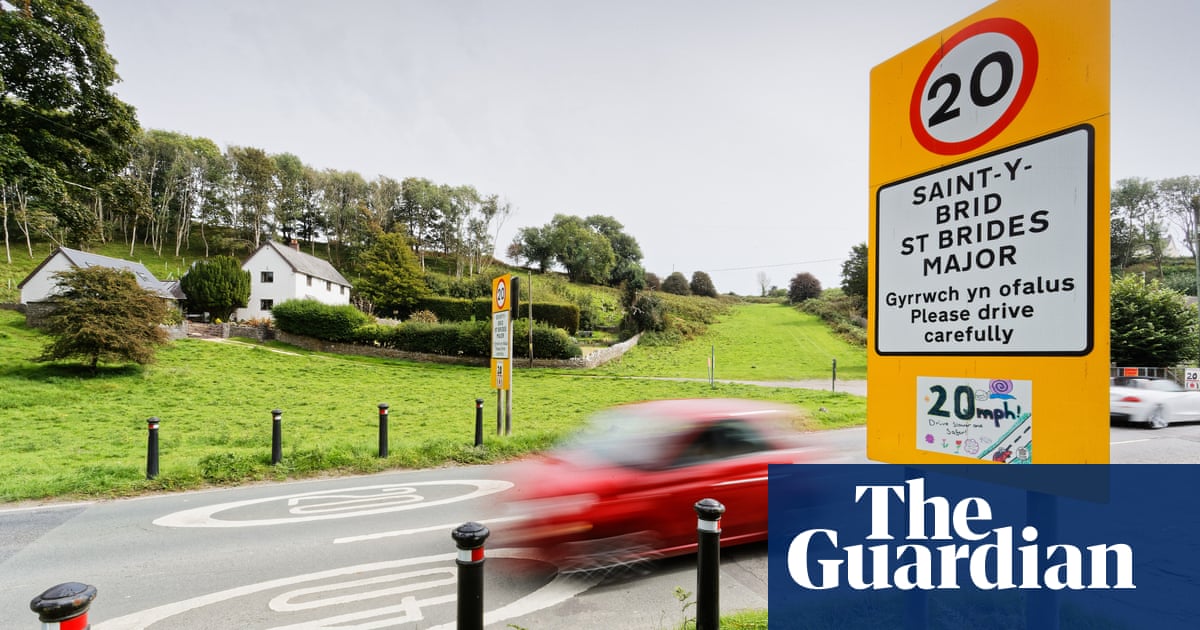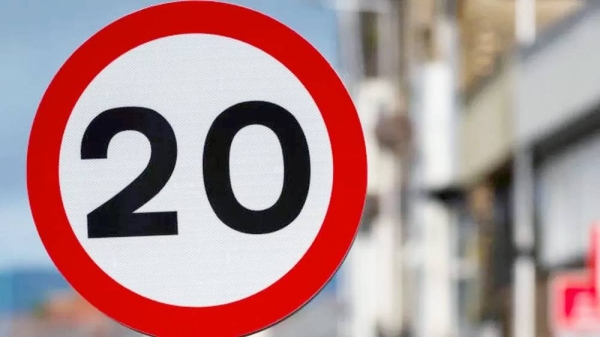
Chris Davies, the genial host of a B&B in the south Wales village of St Brides Major, was in no doubt. “I’ve lived here all my life and the speed limit was always 30mph. People would shoot through. Since it’s been 20mph it’s been brilliant. The roads are quieter and safer for everyone, including my six grandchildren. It takes an extra 40 seconds to travel from one end of the village to the other. If 40 seconds will save a life it’s well worth it.”
Davies was hosting a different kind of party on Thursday – a visit from the Welsh first minister, Mark Drakeford, to remind the citizens of the country that in 10 days’ time a default 20mph limit will be in force on most roads currently set at 30mph.
St Brides Major in the Vale of Glamorgan was one of eight communities chosen to trial the scheme and Drakeford was there to meet residents, safety campaigners, children and even members of the Zumba class to hear their experiences.
“We love it,” said Giselle Hodgkinson, who runs the Zumba sessions. “It’s so much less stressful now for the ladies coming to the class. I think it’s slowed people down and made people kinder.”
Drakeford said he had been most impressed by what the children of St Brides Major told him. “They said the number walking, cycling or scooting to school went from 40% to 70% and when they go home they can play on the streets with their friends without their parents being anxious that traffic would be going too quickly.”
Toni Marley, who has a business on the main street, said she saw a boy knocked over and killed by a motorist travelling – legally – at 30mph. “I know that child would be alive now if that driver had been doing 20. I’m all for it.”
According to Transport for Wales figures, the number of drivers travelling at or below 24mph since the 20mph was introduced in St Brides is up by more than 90%.
Not all are convinced it is working. “I support the idea but people are still ripping through,” said Rebecca Roberts, who works in a soft furnishing shop. Others describe impatient motorists overtaking drivers obeying the 20mph limit and complain that cyclists often whizz through over the 20mph mark.
The Labour-led government says reasons for making the change include reducing deaths and injuries – and thus pressure on the NHS – encouraging more people to walk or cycle and safeguarding the environment. It believes the change could result in 40% fewer collisions and prevent up to 10 deaths and 2,000 injuries a year.
The government accepts not all 30mph limit roads will be suitable for change. These roads will be known as “exceptions” and local authorities will consider with communities which roads should remain at 30mph.
The policy is despised by some. Concerns range from cost – the implementation will come to more than £30m and a government report has said the net loss to the economy because of slower journey times may be £4.5bn over 30 years.
Drakeford said the £4.5bn figure was “notional”. “What we are much more sure of is that the one-off £32m that we will spent implementing the policy will result in savings every year for the NHS of £92m. It is an invest-to-save model. I strongly feel that where Wales is going today others will quickly follow.”
Police and paramedics worry that response times may be slower and eyebrows were raised when the government said firefighters as well as police would be used to clamp down on speeding motorists in 20mph areas.
The Welsh Conservative shadow transport minister, Natasha Asghar, said her party supported 20mph limits in heavily pedestrianised areas but called a nationwide rollout “madcap, ludicrous”.
Adie Parry, a Labour councillor in the town of Buckley, north Wales, said there should not be one size fits all. “If you have a village with twisty roads and a small population it might make sense. Our town is completely different – 20,000 people with almost everyone leaving and arriving twice a day.”
Buckley also trialled the 20mph scheme and has become a hotbed of opposition with drivers tying red ribbons to cars to signal opposition. Opponents have been defacing 20mph signs, an action that seems to have parallels with the attacks onthe ultra-low emission zone cameras in Greater London.
Parry launched a petition against the 20mph scheme that has been signed by more than 60,000 people and is considering quitting as a Labour councillor. “This has damaged a lot of people’s faith in democracy. The money being spent on it is grotesque when most people are feeling the pinch, when NHS waiting lists and child poverty is growing.”
But the Safer St Brides campaigner Nia Lloyd-Knott says the policy is to be welcomed. “I feel much safer as a resident, parent, walker cyclist and driver. Hopefully the other nations will be inspired to follow.”












